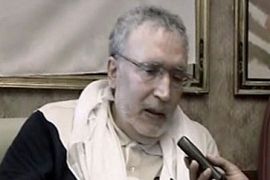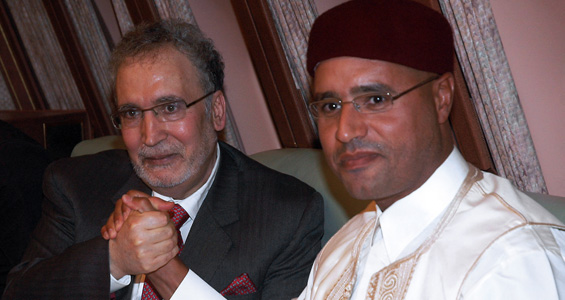Libyans hail al-Megrahi’s return
Many Libyans believe man convicted of Lockerbie bombing was a ‘political hostage’.

 |
| Gaddafi’s son, Seif al-Islam (right), repeated claims Britain encouraged Scotland to release al-Megrahi (left) who was convicted of the 1988 Lockerbie bombing [AFP] |
Muammar Gaddafi, the Libyan leader, had promised that Abdel Basset al-Megrahi, the man convicted of the 1988 Lockerbie bombing, would be home before Ramadan.
But when al-Megrahi was greeted by a jubilant crowd in Tripoli on Friday and hailed as a hero by Libyans, the media in the US was visibly jarred.
“Terrorist celebrated in Libya,” blasted the headline of one US network.
Hillary Clinton, the US secretary of state, expressed disappointment and Barack Obama, the US president, called al-Megrahi’s release a mistake.
Some of the victims’ families expressed outrage, as such a welcoming can only add insult to injury.
But in Libya, al-Megrahi has always been perceived as innocent.
“I know he didn’t do it,” said Ahmed Khalil, a police officer. “I’m sorry for the families, I really am… But Libya was generous in compensating them, even though we all know Libya didn’t do it.”
Many Libyans have doubted their country’s involvement in the bombing, arguing instead that it was the work of another group working for the government of a regional power.
Compensation deal
| In depth | ||
|
|
On December 21, 1988, Pan Am flight 103 exploded over the town of Lockerbie, Scotland, killing 259 passengers and crew, most of them Americans.
Eleven people were killed in the town as debris from the stricken aircraft fell on houses.
The US and UK publicly accused Libya in 1990, yet al-Megrahi and an associate were not tried until ten years later, as part of a complex deal with the Libyan government.
Thereafter, the US and UK agreed to drop sanctions against Libya, when Gaddafi agreed to pay $2.7bn in compensation to the victims’ families and to surrender two men identified as suspects by US and UK intelligence.
But despite his conviction by a panel of Scottish judges at Camp Zeist, a special court set up in the Netherlands in 2001, most Libyans rallied for his release, insisting he was innocent.
To this day, Libya has always denied responsibility for the bombing.
Salha Bashir, a university student studying political science, said she thought the entire trial was fake and that al-Megrahi was only a scapegoat.
Libyans, on the eve before they begin celebrating the holy month of Ramadan, anxiously awaited al-Megrahi’s return not only because they believe he is innocent, but because al-Megrahi, as one official told Al Jazeera on the condition of anonymity “represents something the West took from us.”
Libyans, who in recent years have welcomed western business, have always seen al-Megrahi’s freedom as tantamount to better relations with the West.
Gaddafi did not pretend to think otherwise.
In an interview with Libya’s official news agency Jana, he thanked Britain for encouraging Scotland to release al-Meghrahi, saying it was: “In the interest of relations between the two countries… and will be positively reflected for sure in all areas of cooperation between the two countries.”
Britain denied the claim, even as Gaddafi’s son, Seif al-Islam, affirmed them once more.
‘Political hostage’
 |
| The December 22, 1988 bombing of Pan Am flight 103 killed 270 people [AFP] |
During a Friday night television interview on his TV channel Al-Moutaouasset, he said all British interests were linked to al-Megrahi’s release and that the case was discussed with Tony Blair, the former prime minister, who in 2007 signed off on an agreements for gas exploration in Libya.
Hours after his release, Jana issued a statement from the government saying that al-Megrahi had been “a political hostage.”
Tarek Khalifah, watched the scene on his small TV in his shop near Tripoli’s fish market.
“I believe he’s an innocent man whom God wanted to set free so that he may live out his last days with his family. By his coming home, we think justice is now really served.”
Hajja Halouma, an old woman from the Old City in Tripoli, recalled the 1986 US bombing of Libya in which Gaddafi’s adopted daughter and 30 people were killed.
Some saw the Lockerbie bombing as retaliation.
“Why don’t Americans remember that,” she said. “I am happy for his [al-Megrahi’s] mother.”
Now, as Gaddafi marks his 40th year in power, he can say he restored relations with the West without cowering to their demands.
However, not all in Libya are celebrating.
Samia, a housewife was quick to say al-Megrahi’s family should be the only people celebrating, and that Libyans should worry about themselves and their “lowly life.”
“His mother should be happy, not me,” she said, before proceeding to complain about the high cost of pharmaceuticals, horrible traffic and “fasad”, or corruption, in the country.

